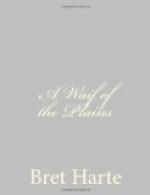He awoke betimes to find himself already in the mountains. Buckeye Mills was a straggling settlement, and Clarence prudently stopped any embarrassing inquiry from his friend by dropping off the wagon with his equipment as they entered it, and hurriedly saying “Good-by” from a crossroad through the woods. He had learned that the nearest mining camp was five miles away, and its direction was indicated by a long wooden “flume,” or water-way, that alternately appeared and disappeared on the flank of the mountain opposite. The cooler and drier air, the grateful shadow of pine and bay, and the spicy balsamic odors that everywhere greeted him, thrilled and exhilarated him. The trail plunging sometimes into an undisturbed forest, he started the birds before him like a flight of arrows through its dim recesses; at times he hung breathlessly over the blue depths of canyons where the same forests were repeated a thousand feet below. Towards noon he struck into a rude road—evidently the thoroughfare of the locality—and was surprised to find that it, as well as the adjacent soil wherever disturbed, was a deep Indian red. Everywhere, along its sides, powdering the banks and boles of trees with its ruddy stain, in mounds and hillocks of piled dirt on the road, or in liquid paint-like pools, when a trickling stream had formed a gutter across it, there was always the same deep sanguinary color. Once or twice it became more vivid in contrast with the white teeth of quartz that peeped through it from the hillside or crossed the road in crumbled strata. One of those pieces Clarence picked up with a quickening pulse. It was veined and streaked with shining mica and tiny glittering cubes of mineral that looked like gold!




